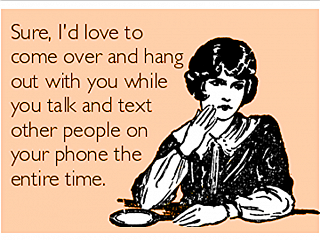When people are phone snubbed by others, they tend to turn to social media and take shelter into smartphones themselves.

When people are phone snubbed by others, they tend to turn to social media and take shelter into smartphones themselves. The avoidance circle of face-to-face interactions then begins.
Individuals tend to seek attention. When people are taken into consideration, appreciated and involved, they feel satisfied and accomplished. On the other hand, when people are ignored, they tend to feel offended and the attentions’ need increases.
A recent study from the Baylor University conducted by Dr Meredith David, assistant professor of marketing, and Dr James A. Robert, professor of Marketing, investigated the social behaviour of individuals, founding that when people are phone snubbed they get upset and require to compensate for the face-to-face lack of attention and consideration, seeking it on social media.
Like me on Facebook and I will feel important; give me a heart on Instagram and I will feel appreciated; follow me on Twitter and I will feel interesting; connect with me on LinkedIn and I will feel influent. Social media shape our lives and our social behaviour and satisfaction.
Dr Robert and Dr David’s study, “Phubbed and Alone: Phone Snubbing, Social Exclusion, and Attachment to Social Media,” is published in the Journal of the Association for Consumer Research. The research investigates the relationship between phubbing, social media attachment, depression, anxiety and stress.
“When an individual is phubbed, he/she feels socially excluded which leads to an increased need for attention. Instead of turning to face-to-face interaction to restore a sense of inclusion, study participants turned to social media to regain a sense of belonging,” explained the lead author of the research Dr David. “Being phubbed was also found to undermine an individual’s psychological well-being. Phubbed individuals reported higher levels of stress and depression.”
“We’re looking online for what we’re not getting offline,” Dr Roberts added. “It’s a vicious cycle.”
The research involved surveys with more than 330 participant, carried out through two studies. The researchers found that:
> Almost half of the phubbed individuals reported spending more than 90 minutes per day on their phone.
> More than one-third of the phone snubbed people turned to social media to interact with different people.
> About one-quarter of the phone snubbed individuals reported spending more than 1.5 hours every day using social media websites.
> More than half of the phone snubbed participants recognised to social media the capacity of enhancing their life and overall improving it. Most of them explained that receiving comments on their social media posts results for them in improved acceptance and affirmation.
“Although the stated purpose of technology like smartphones is to help us connect with others, in this particular instance, it does not,” Dr David explains. “Ironically, the very technology that was designed to bring humans closer together, has isolated us from these very same people.”
Dr Roberts, also writer of “Much of a Good Thing: Are You Addicted to Your Smartphone?” added that the trends outlined by the current study are troubling.
“Our inability to separate from technology is devastating to our well-being,” he explained. “Even if it’s not an addiction, it’s a deeply engrained habit.” Recognising the possible negative impacts of technology over-use, the researchers suggest to users to keep some time and spaces free from smartphones, while agreeing on such terms with friends and family and colleagues, in order to improve motivation in sticking to the rule. They also suggest a positive use of technology, by the download of apps useful to monitor, track and control the actual use of the smartphone, possibly to generate self awareness. “All this research into phubbing would be for naught, or only an interesting story, if not for the revelation that this type of behavior can drive others’ use of social media in an attempt to regain inclusion,” the researchers wrote in their study. “Additionally, such behavior can also impact the well-being of affected individuals.”
Written by: Pietro Paolo Frigenti
Journal Reference: Meredith E. David and James A. Roberts. Phubbed and Alone: Phone Snubbing, Social Exclusion, and Attachment to Social Media. Journal of the Association for Consumer Research, 2017 2:2, 155-163
